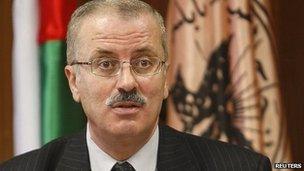New Palestinian PM Rami Hamdallah offers resignation
- Published

Newly appointed Palestinian PM Rami Hamdallah has offered his resignation to President Mahmoud Abbas, government sources say.
It was not immediately clear whether Mr Abbas had accepted the resignation. Sources say Mr Hamdallah quit in a disagreement over his authority.
An academic and political independent, he was sworn in on 6 June.
He replaced Salam Fayyad who stepped down in April after a long-running dispute with President Abbas.
Mr Hamdallah was given two deputies - one for political affairs and one for economic affairs - but resigned because of a "conflict over authority", reports say.
If Mr Hamdallah's resignation is accepted, it could leave a damaging gap as the Palestinian leadership grapples with a financial crisis and the US leads efforts to revive peace talks with Israel, says the BBC's Yolande Knell in Ramallah.
Mr Hamdallah's cabinet had only met for the first time last week. It consisted mainly of members of the Fatah party, one of the two main Palestinian political factions, led by Mr Abbas.
At the time, commentators observed that the new PM would have little room to manoeuvre in a government dominated by Fatah members, our correspondent says.
The other main faction, Hamas, described the appointment of Mr Hamdallah as "illegal" because it was not a unity government formed as a result of a reconciliation agreement.
'Transition period'
When he was appointed, Mr Hamdallah stated his administration would rule only for "a transitional period" until a unity government was formed.
His appointment filled a political vacuum in the Palestinian Authority, but now it appears it has opened up again - and that will be deeply troubling for President Abbas, our correspondent says.
Before his appointment as PM, Mr Hamdallah had been known for his 15-year tenure as head of the al-Najah National University, and did not have a high profile as a politician.
There has been a deep rift between the two main Palestinian factions since 2007, when Hamas set up a rival government in Gaza after ousting Fatah in clashes.
The two factions are currently engaged in drawn-out reconciliation talks. Last month, officials on both sides announced plans to form a technocratic government by August that would then prepare for new elections.